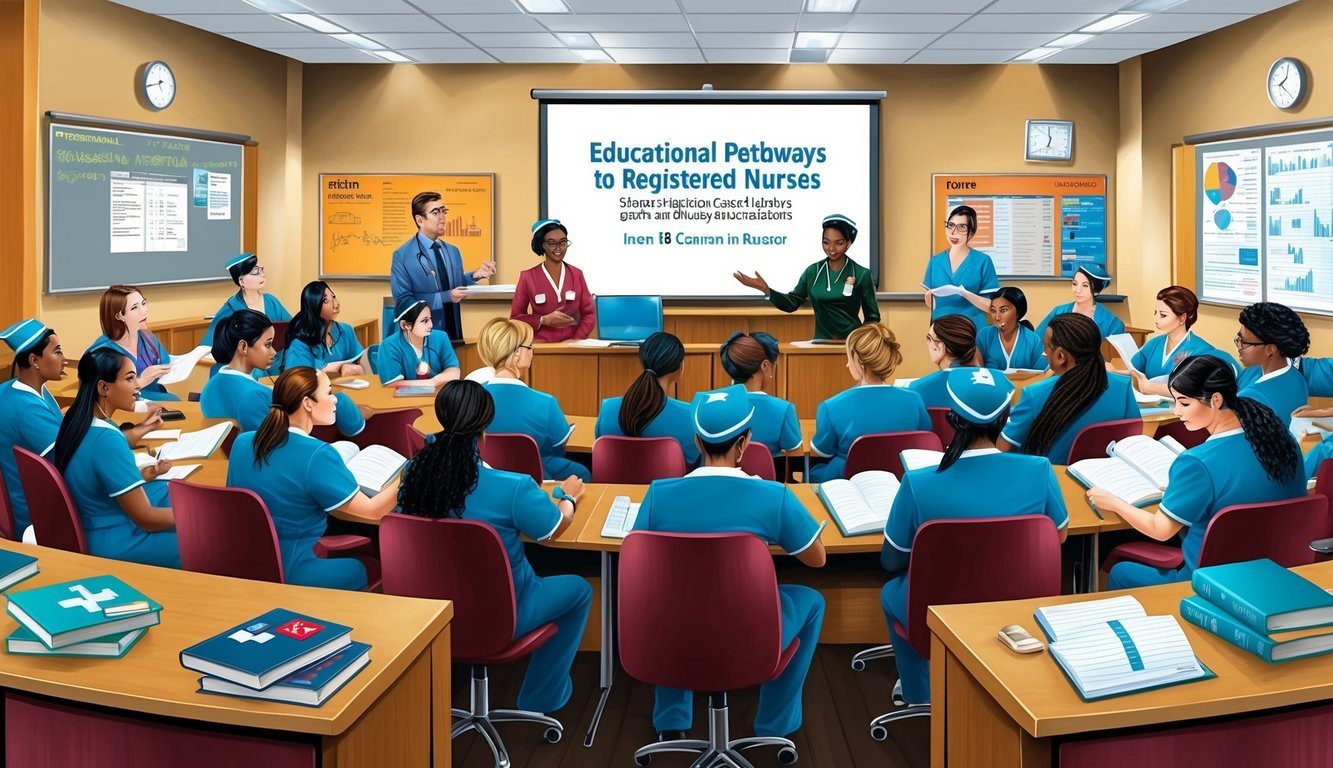Choosing the right college for registered nursing can significantly impact your career trajectory and job satisfaction.
Numerous accredited nursing programs are available, each offering various specializations and degrees.
Make sure to select a program that aligns with your career goals and meets the licensing requirements in your state.
Many institutions provide comprehensive curriculums designed to prepare you for the NCLEX-RN exam and your future nursing career.
Factors to consider include program accreditation, clinical rotation opportunities, and student support services.
Exploring options like traditional BSN programs or accelerated courses can also help you find the right fit for your educational needs.
For a closer look at some of the top-rated nursing schools, check out the best nursing schools in the US.
Many institutions provide comprehensive curriculums designed to prepare you for the NCLEX-RN exam and your future nursing career.
Factors to consider include program accreditation, clinical rotation opportunities, and student support services.
Exploring options like traditional BSN programs or accelerated courses can also help you find the right fit for your educational needs.
For a closer look at some of the top-rated nursing schools, check out the best nursing schools in the US.
Location and financial considerations are essential in your decision-making process.
While some students may prefer local colleges to minimize living costs, others might pursue prestigious programs even if it means relocating.
Understanding the acceptance rates and graduation requirements of various programs can aid in making an informed choice.
By doing thorough research and utilizing resources like RegisteredNursing.org, you can set yourself on the path to a successful nursing career.
Understanding the Role of Registered Nurses
Registered Nurses (RNs) play an essential role within the healthcare system.
They provide critical patient care, educate patients and their families, and collaborate with other healthcare professionals.
Understanding the scope of their practice and the pathway to becoming an RN can offer valuable insights into this rewarding career.
Scope of Nursing Practice
The scope of nursing practice encompasses a wide array of responsibilities aimed at ensuring patient health and safety.
Registered Nurses are responsible for tasks such as:
- Patient Assessment: Collecting comprehensive health histories and performing physical examinations.
- Clinical Decision-Making: Evaluating patient conditions and developing nursing care plans tailored to individual needs.
- Patient Education: Instructing patients on health management, medication adherence, and lifestyle changes.
RNs work in various settings, including hospitals, clinics, and community health organizations, making their role adaptable to different healthcare environments.
They may also specialize in fields such as pediatrics, geriatrics, or emergency care, allowing for a diverse range of career paths.
The Journey to Becoming a Registered Nurse
To become a Registered Nurse, you typically need to complete certain educational requirements, including earning either an Associate Degree in Nursing (ADN) or a Bachelor of Science in Nursing (BSN).
Here’s a common pathway:
- Education: Complete an accredited nursing program.
- Licensing: Successfully pass the NCLEX-RN exam to obtain state licensure.
- Clinical Experience: Gain hands-on experience through clinical rotations as part of your training.
Each state may have specific requirements for licensure, including background checks and proof of education.
For more detailed information about these steps, you can refer to resources like Nurse.com.
This structured approach ensures you are well-prepared to meet the diverse needs within nursing practice.
Educational Pathways in Nursing

As you consider a career in nursing, understanding the various educational pathways is crucial.
These pathways lead to different degrees and qualifications, influencing your career opportunities and potential salaries.
Associate Degree in Nursing (ADN) Programs
The Associate Degree in Nursing (ADN) is typically a two-year program offered by community colleges and some universities.
This degree provides foundational nursing education, including clinical training and coursework in anatomy, pharmacology, and patient care.
Upon completion of an ADN program, you are eligible to take the NCLEX-RN exam to become a licensed registered nurse.
The ADN is often more affordable than a Bachelor of Science in Nursing (BSN) program, with average tuition costs around $3,860 annually for a two-year degree.
ADN programs emphasize practical skills and clinical experience, making it an attractive option for those entering the healthcare field quickly.
To find ADN programs near you, consider resources such as Nursing World.
Bachelor of Science in Nursing (BSN) Programs
The Bachelor of Science in Nursing (BSN) is a four-year degree that includes a broader curriculum, combining nursing theory, leadership, and research.
The BSN program prepares you for advanced nursing roles and enhances critical thinking skills.
This degree option often leads to higher starting salaries.
You will complete courses in subjects like community health, nursing ethics, and management, along with required clinical rotations.
Graduates can pursue specialized fields, including family nurse practitioner roles or advanced practice nursing.
Schools offering BSN programs may vary in cost, typically around $42,000 per year on average.
Completing a BSN can also make you eligible for master’s programs like the Master of Science in Nursing (MSN).
Explore various BSN programs through Nursing Process.
Advanced Nursing Degrees
For those seeking to advance their careers, master’s degrees and doctoral programs in nursing are available.
A Master of Science in Nursing (MSN) typically requires a BSN and allows you to specialize in areas like nurse practitioner, nurse educator, or clinical nurse leader.
Doctoral degrees, such as the Doctor of Nursing Practice (DNP) or PhD in Nursing, prepare you for leadership roles, research, or teaching positions.
These programs usually require several years of study beyond the MSN level.
Choosing the right advanced degree will depend on your career goals and interests in nursing.
Advanced degrees can significantly enhance your earning potential and career opportunities.
For more details on nursing pathways, visit Best Colleges.
Top Colleges and Universities for Nursing
When pursuing a career in nursing, selecting the right college or university is crucial.
Several institutions stand out due to their rigorous programs, high acceptance rates, and exceptional NCLEX pass rates.
Here’s a look at some critical factors in evaluating these schools and prominent programs worthy of consideration.
Evaluating the Best Nursing Schools
To identify the best nursing schools, consider factors such as acceptance rates, NCLEX pass rates, program offerings, and facility resources.
Schools like the University of Pennsylvania boast an acceptance rate of 7% and offer a comprehensive Bachelor of Science in Nursing (BSN) program.
Additionally, Duke University is known for its outstanding graduate nursing programs, particularly for those seeking an MSN with a focus on nurse anesthesia.
Schools like Ohio State University and University of North Carolina, Chapel Hill also provide robust nursing programs and supportive learning environments, making them excellent choices for aspiring registered nurses.
Notable Nursing Programs and Their Acceptance Rates
Here’s a snapshot of some notable nursing programs along with their acceptance rates:
| University/College | Acceptance Rate | NCLEX Pass Rate |
|---|---|---|
| University of Pennsylvania | 7% | 93% |
| Duke University | 9% | 91% |
| Ohio State University | 51% | 91% |
| University of North Carolina, Chapel Hill | 25% | 95% |
Programs at these institutions are competitive but offer strong support systems and educational resources.
For example, Ohio University provides various specialties and a dual MSN/MBA degree option, catering to diverse career goals.
Prioritizing schools with high NCLEX pass rates is essential, as this exam is critical for becoming a licensed nurse.
Licensure and Certification for Registered Nurses

To become a registered nurse, you must meet specific licensure requirements and consider specialty certifications.
Both components are essential for ensuring you are well-prepared for your nursing career.
The NCLEX-RN Examination
The NCLEX-RN examination is a crucial step in obtaining your nursing license.
This exam assesses your knowledge and competencies essential for safe and effective nursing practice.
- The exam comprises multiple-choice questions covering areas like pharmacology, infection control, and patient care.
- You must prepare thoroughly, as the NCLEX-RN pass rate typically hovers around 85% for first-time test takers.
To register for the exam, you need to apply through your state’s Board of Nursing.
The exam can be taken once you complete your nursing degree, either an Associate Degree in Nursing (ADN) or a Bachelor of Science in Nursing (BSN).
Failing the exam means additional study and a waiting period before reattempting.
Resources for exam preparation can be found at the National Council of State Boards of Nursing (NCSBN).
Specialty Certifications in Nursing
In addition to obtaining your RN license, pursuing specialty certifications can enhance your qualifications.
The American Nurses Credentialing Center (ANCC) offers various certifications that validate your expertise in specific areas.
Some common specialty certifications include:
- Wound Care
- Critical Care
- Pediatric Nursing
- Psychiatric-Mental Health Nursing
Each certification has distinct eligibility requirements and may require a combination of education, experience, and passing an examination.
Specialty certifications can significantly improve your employment opportunities and potentially lead to higher salaries.
These credentials demonstrate your commitment to advancing your knowledge and skills in nursing.
Clinical Experience and Specializations in Nursing

Clinical experience is crucial for developing the practical skills necessary for registered nurses.
Through hands-on training and exposure to various healthcare settings, you can identify your interests and strengths in nursing.
Specializations allow you to tailor your career based on these experiences.
Gaining Practical Skills Through Clinical Rotations
During your nursing education, clinical rotations provide a vital opportunity to apply theoretical knowledge in real-world situations.
You will work alongside experienced healthcare professionals in diverse settings, such as hospitals, clinics, and community health organizations.
These experiences help you build essential skills, including:
- Patient assessment
- Medication administration
- Evidence-based practice: Utilizing research to inform your clinical decisions
Participating in rotations focused on public health and health promotion can deepen your understanding of community health nursing.
You’ll learn about patient education strategies to enhance health outcomes.
Specialty Areas in Nursing
Nursing offers various specialty areas, allowing you to focus your practice on specific patient populations or health conditions.
Common specialties include:
- Mental Health Nursing: Focused on mental health assessment, diagnosis, and treatment.
- Public Health Nursing: Emphasizing health promotion and disease prevention in communities.
- Community Health Nursing: Addressing the health needs of specific populations through outreach and education.
Each specialty requires additional training and may lead to certifications.
Exploring these areas during your clinical rotations can help you discover where your passions lie and build a fulfilling nursing career.
For more information on nursing specializations, visit Forbes.

